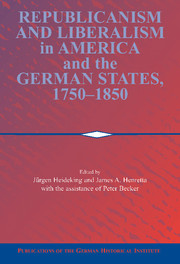Book contents
- Frontmatter
- Introduction
- PART I OVERVIEW
- PART II THE REPUBLICAN WORLD
- 2 The Concept of the Republic in Eighteenth-Century German Thought
- 3 Kant’s Republicanism and Its Echoes
- 4 Constitutions, Charity, and Liberalism by Default: Germany and the Anglo-American Tradition
- 5 Politics and Sentiment: Catharine Macaulay’s Republicanism
- 6 Between Liberalism and Republicanism: “Manners” in the Political Thought of Mercy Otis Warren
- PART III THE TRANSITION FROM REPUBLICANISM TO LIBERALISM
- PART IV THE LOGIC OF LIBERALISM
- Index
2 - The Concept of the Republic in Eighteenth-Century German Thought
Published online by Cambridge University Press: 05 January 2013
- Frontmatter
- Introduction
- PART I OVERVIEW
- PART II THE REPUBLICAN WORLD
- 2 The Concept of the Republic in Eighteenth-Century German Thought
- 3 Kant’s Republicanism and Its Echoes
- 4 Constitutions, Charity, and Liberalism by Default: Germany and the Anglo-American Tradition
- 5 Politics and Sentiment: Catharine Macaulay’s Republicanism
- 6 Between Liberalism and Republicanism: “Manners” in the Political Thought of Mercy Otis Warren
- PART III THE TRANSITION FROM REPUBLICANISM TO LIBERALISM
- PART IV THE LOGIC OF LIBERALISM
- Index
Summary
The European states that were constitutionally designated as “free” were of special interest for the politicized public that began to develop in the 1760s and that so intensively examined the nature of the different forms of state and government and the degree of freedom they afforded. This public sought to clarify its relationship to the existing governmental orders, critically comparing the monarchic absolutism dominant in Germany with contemporary and ancient republics. A new trend of thought began to emerge that, in a nutshell, accorded only the “republics” the attribute of “freedom,” investing this term with the meaning of “free state.” Opponents did not want to restrict the label of freedom to institutional participation of citizens in political decision making. Instead, they attempted to establish a positive relationship with the absolutist states and disputed the claim of the existing republics to the label of “free state”.
To better understand the term republic, it is illuminating to read the relevant article in Zedler’s Universallexikon, the leading encyclopedia of the time. In addition to the broad definition of “common entity,” Zedler also considered a narrower “republic in specific terms, meaning a free people, country, city, or town knowing no leader, or only one of a certain limited thought.” He distinguished three varieties:
1. Those which elect a leader for life or for an established short period, such as Venice, Genoa, etc.; 2. those which elect several of the wealthiest or most renowned citizens of their city or state to govern alternately or for life, such as most imperial cities; 3. several provinces, estates or cities which confederate to form a republic with each maintaining its own form of government, such as Switzerland and the Netherlands.
- Type
- Chapter
- Information
- Publisher: Cambridge University PressPrint publication year: 2002
- 2
- Cited by

